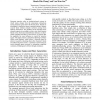Free Online Productivity Tools
i2Speak
i2Symbol
i2OCR
iTex2Img
iWeb2Print
iWeb2Shot
i2Type
iPdf2Split
iPdf2Merge
i2Bopomofo
i2Arabic
i2Style
i2Image
i2PDF
iLatex2Rtf
Sci2ools
137
click to vote
AIIDE
2008
2008
Simulation-Based Story Generation with a Theory of Mind
Emergent narrative refers to simulation-based systems in which stories emerge from the autonomous interactions among character agents and/or the human player. Despite its advantages in interactive games, emergent narrative attracts concern about whether complex narratives emerge from arbitrary interactions. This problem can be alleviated if the character agents act according to what a story should require. Based on the observation that deliberate influence on others' minds constitutes the fabric of most stories, we propose that the capability for social influence is crucial for narrative agents. This paper presents a specialized planning technique called social planning, which allows a character agent to achieve its goal by reasoning about other characters' minds and influencing their actions. A prototype system based on social planning agents succeeds in generating simplified variations of Shakespeare's Othello through simulation.
AIIDE 2008 | Artificial Intelligence | Character Agent | Emergent Narrative | Emergent Narrative Refers |
| Added | 02 Oct 2010 |
| Updated | 02 Oct 2010 |
| Type | Conference |
| Year | 2008 |
| Where | AIIDE |
| Authors | Paul Hsueh-Min Chang, Von-Wun Soo |
Comments (0)

